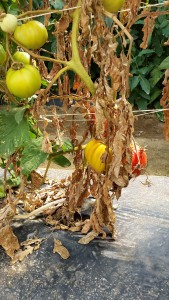Basil downy mildew (Peronospora belbahrii) has been found in a field near Vineland, New Jersey. This is the first report of downy mildew in field-grown basil in New Jersey this year. All basil growers need to scout on a daily basis and initiate a preventative fungicide program.
White Mold in Greenhouse & High Tunnel Tomato
White mold, or timber rot, caused by the soil-borne fungal pathogen, Sclerotinia sclerotiorum, was found this past week in a high tunnel.
White mold is common and once introduced into a field or high tunnel it can very difficult to control. The pathogen produces black sclerotia on the surface and inside infected stems. Sclerotia, if they make their way back into the soil, can survive for years causing significant problems.
Infected stems will turn a light brown color and dry up becoming brittle. If the main stem is infected the entire plant will collapse looking like a wilt or root rot issue.
Under hot, humid conditions white fungal growth will develop on the surface of the stems and in some cases sclerotia will develop on the outside of the stem. Breaking open the stem will reveal numerous black sclerotia.
All infected plants and or plant material need to be removed from the greenhouse or high tunnel immediately and disposed of properly. Preventative protectant fungicide programs beginning at flowering will help control white mold. Cool, wet weather and poor air circulation favors disease development.
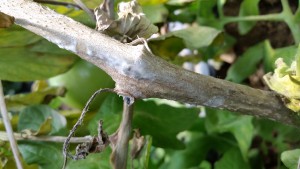
Tomato stem infected by white hold. Note the fungal growth on the surface of the stem.
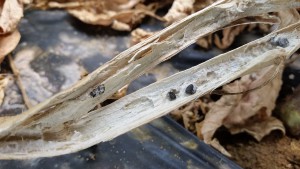
White mold of tomato. Note the black sclerotia developing inside the brittle stems.
Wet Weather and Strawberry Fruit Rots
Wet weather is expected to come in during the first part of the week and linger around for most of it. Now that strawberries are in full production growers need to pay close attention to fruit rots such as anthracnose and botrytis. Overipe or unharvested mature berries left in commercial or u-pick fields can act as sources of inoculum for both pathogens. Importantly, both pathogens can develop and spread rapidly under wet, rainy conditions and the appropriate protectant fungicides need to be applied ahead of any inclement weather.
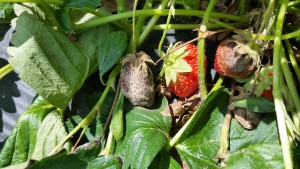
Botrytis, or grey mold, on mature strawberry fruit. Botrytis can develop and spread rapidly under cool, wet conditions.
[Read more…]
Vegetable Disease Update – 5/25/15
Pepper
Bacterial leaf spot – Symptoms of bacterial leaf spot on pepper leaves include small, brown water-soaked lesions that turn brown and necrotic in the centers. Spots may coalesce and form large blighted areas on leaves and premature defoliation can occur. On fruit, brown lesions can form which have a roughened, cracked wart-like appearance. High temperatures, high relative humidity and rainfall favor Bacterial spot development. Loss from Bacterial spot can be reduced somewhat by maintaining high levels of fertility, which will stimulate new growth. Applying a fixed copper (M1) at labeled rates or may help suppress spread. Quintec (quinoxyfen, 13) at 6.0 fl. oz/A is now labeled for the suppression of bacterial leaf spot in pepper in the mid-Atlantic region. Please see the 2015 New Jersey Commercial Vegetable Production Recommendations Guide for more information. [Read more…]
Hot Dry Weather and Transplant Death
Transplants that are not allowed to harden-off for a few days outside prior to setting in the field may suffer significantly. It is important to expose all transplants to some normal weather conditions before transplanting so they can become acclimated to light intensity as well as the wind and other field conditions. [Read more…]
Vegetable Diseases of the Week – 5/25/15
This week: Anthracnose fruit rot and botrytis fruit rot of strawberry.
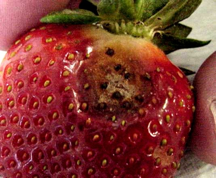
Anthracnose fruit rot of strawberry.
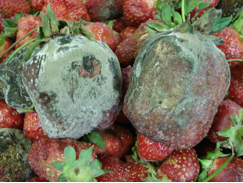
Botrytis fruit rot of strawberry
